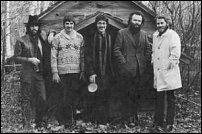
The Band
Music From Big Pink - The Band - Stage Fright - Cahoots
Robert Wilonsky
From Phoenix New Times, 08/31/2000. Copyright © 2000 New Times, Inc. All rights reserved.
 The Band takes a load off with a quartet of reissues |
![[Music from Big Pink]](../band_pictures/mfbp_cdnow_reissue.jpg)
|
The first two Band albums are among those rare discs that never wear down or out the longer you play them; they survive -- thrive -- with each successive spin. Those who talk, write and theorize all day long about the vintage clothing and Robert E. Lee mentions and how The Band pieced together an America that exists only in history books miss the thrill of creation, the way four Canucks and a good ol' boy from Arkansas "rebelled against the rebellion," as Helm wrote in his book This Wheel's on Fire. During the era of psychedelics and other indulgences, The Band kept it short and sweet: They opened the first record with a slow song ("Tears of Rage"), allowed nary a single guitar solo anywhere on the album and let the horns and organs play 'til they ran out of breath. Music From Big Pink sounds as if it was recorded during a party at which everyone swapped bottles and instruments. The extras only affirm that notion, especially "If I Lose" (an old Stanley Brothers song), Richard Manuel's solo pianos-and-vocals take on "Orange Juice Blues" (sounds like some old OKeh single from the 1930s) and the oft-bootlegged "Ferdinand the Imposter," which is as close to soused and sloppy as The Band ever got.
The outtakes on The Band are most notable for the inclusion of alternate versions of "The Night They Drove Old Dixie Down" and "Jemima Surrender." The former is a stop-and-start affair, the sound of men making it up as they go; listening to it is like watching a magician reveal his tricks. It begins like some half-remembered dream, with the sound of nothing but a slightly strummed acoustic guitar guiding a falsetto, barely heard vocal (most likely Manuel's) until a piano appears suddenly, quietly, in the distance. The Band then launches into the song, only to stop once more; everything's a little . . . off. The third time's the charm, only this time, the song contains overdubs not heard on the final version -- a little flute, perhaps, and other accompaniment later deemed unnecessary (including out-of-tune horns). The version of "Jemima Surrender" is most notable for the fact that Manuel plays drums on it, while Helm plays guitar; in the end, it mattered little who played what.
Capitol found fewer extras to include on Stage Fright and
Cahoots: Both discs contain radio commercials among their
handful of rarities, and they're nothing more than oddities meant to
satisfy the cultist. The alternate take of "Daniel and the Sacred
Harp" off the third disc is interesting, if only because it sounds like
a brilliant, half-assed demo; the "W.S. Walcott Medicine Show"
outtake, mixed by Todd Rundgren, is more horn-heavy than its
album counterpart. Cahoots features the organ-drenched "Bessie
Smith," which fans long assumed was a Basement Tapes song
(hell, Helm says as much in his book), though Robertson insists it
was in fact recorded during the period between Stage Fright and
Cahoots. But the best outtake on that record is "Don't Do It," a
live version of which appeared on Rock of Ages (the song is just
a redo of the Holland-Dozier-Holland song "Baby, Don't You Do
It" written for Marvin Gaye in 1964). No longer the prerequisite
show-closer, the unreleased studio version sounds not so unlike
The Band when it was The Hawks, playing shitholes with Ronnie
Hawkins in the early 1960s. It's rough, ramshackle and rock 'n'
roll -- the sound of five men who made magic even when they
were just killing time.
![[The Band]](../band_pictures/tb_cdnow_reissue.jpg)
![[Stage Fright]](../band_pictures/sf_cdnow_reissue.jpg)
![[Cahoots]](../band_pictures/cahoots_cdnow_reissue.jpg)